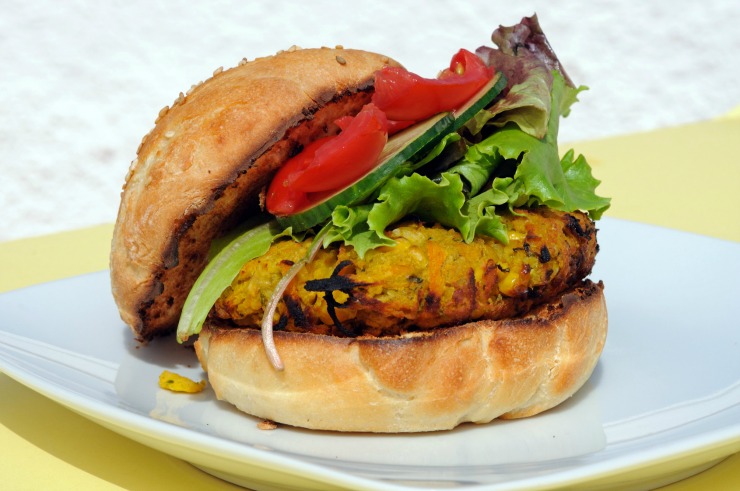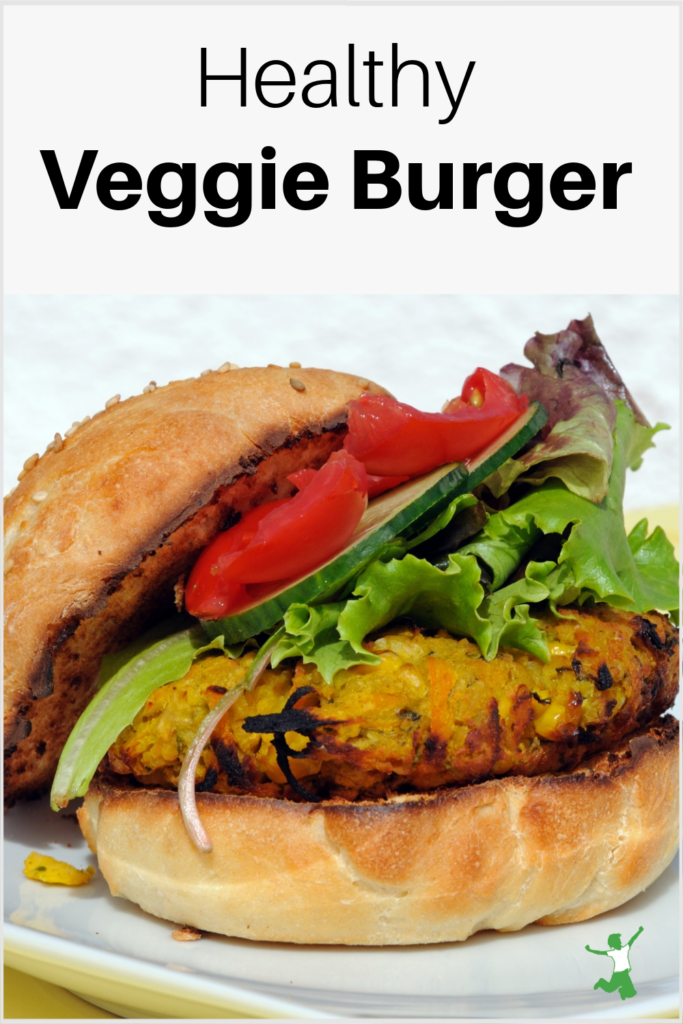Table of Contents[Hide][Show]
Homemade veggie burgers that taste delicious and are made traditionally with no soy or MSG that can serve as a budget-friendly replacement for meat occasionally.

Back in my lowfat eating days in the 1990s, I used to eat a lot of veggie burgers to limit the amount of red meat in my diet. Thankfully, those days are but a distant memory!
I now know, of course, that grassfed beef is one of the healthiest meats you can possibly consume and I usually eat it several times a week. Saturated fat is not the villain of heart and health that the conventional medical establishment makes it out to be.
Rather, saturated fat is good for you, is no danger to cardiovascular health and should be consumed liberally in the diet!
Despite my regular consumption of grassfed burgers, I must admit that I still have a bit of a penchant for a good quality veggie burger.
I don’t ever buy them at the store, however, as processed veggie burgers are typically made with soy as the meat replacement and MSG is used to give the tasteless burgers a synthetic meaty flavor.
Soy and MSG together are a powerful one-two punch to the hormone system and are guaranteed to mess things up in a hurry.
It will probably give you a nasty headache too!
Therefore, when you get a hankering for veggie burgers, avoid the seitan and products containing it and make some yourself.
The good news is that you can make a bunch of them at one time. Then, freeze what you don’t use right away so that you have some handy for quick meals when necessary.
No Soy or MSG!
Below is the recipe I use for homemade veggie burgers which is based on the Middle Eastern recipe known as falafel or chickpea patties. You will love it! It was inspired by Nourishing Traditions Cookbook. (1)
Sprouting or soaking legumes like chickpeas before cooking greatly improves their digestibility, so this is the traditional method I recommend.
Please do not use the chickpea cooking water though as practiced by some espousing a plant-based diet. It is laced with anti-nutrients and quite damaging to health. It can even encourage the development of leaky gut.
If the real food budget is tight, homemade veggie burgers can be frequently used as a meat replacement with no compromise to health if and only if liberal amounts of homemade broth/stock and organ meats are being consumed on a regular basis.
In other words, nose to tail eating as was practiced by healthy traditional societies is what is necessary if muscle meat is limited either due to lifestyle or budget. (2)

Healthy Veggie Burgers
Homemade veggie burgers that actually taste good and are made traditionally with no soy or MSG that can serve as a budget friendly replacement for meat on a regular basis.
Ingredients
- 2 cups dried chickpeas preferably heirloom and organic
- 1/4 cup expeller pressed coconut oil or lard
- filtered water
- 4 Tbsp lemon juice
- 1 egg beaten
- 1/2 cup parsley finely chopped, preferably organic
- 2 small onions finely chopped, preferably organic
- 4 cloves garlic minced, preferably organic
- 1 tsp ground cumin
- 1 tsp ground coriander
- 1/2 tsp pepper
- 1 tsp sea salt
- sourdough burger buns optional
Instructions
-
Place dried chickpeas in a large pot and cover with boiling water. Stir in lemon juice, cover and leave on the counter for 12 hours or overnight. Drain, cover the chickpeas with more boiling water, and stir in 2 more Tbsp lemon juice. Leave on the counter for another 12 hours. Drain and rinse chickpeas.
-
Process soaked chickpeas in batches depending on the size of your food processor with the beaten egg, onion, parsley, garlic, and spices until a coarse paste is formed that holds together.
-
Cover and refrigerate chickpea paste for at least 1 hour.
-
Serve veggie burgers on sourdough buns with sliced tomatoes, cucumbers, avocado, and homemade sauces of choice.

(1) Nourishing Traditions, p. 506
(2) Meat, Organs, Bones and Skin








You state, “Rather, saturated fat is good for you, is no danger to cardiovascular health and should be consumed liberally in the diet!”
True enough. But that’s not the issue. The problem with regular consumption of red meat is that it will result in over-mineralization, specifically of iron. Two members of my family who love red meat got stomach cancer and died of it; and a third family member has chronic stomach problems, including symptoms suggesting that he was next in line for the disease, so his M.D. told him to quit with all the red meat. This doctor was not a vegetarian or anything, he was just one of the few doctors who knows the score.
Stomach cancer is just the beginning; there’s lots more to know.
Re avoiding the liquid from cooking chickpeas. If you buy any kind of canned beans, I think it says on the label to drain and rinse. How ’bout that…
My Grandfather was a butcher and ate red meat most every day his whole adult life. Died in his sleep at 97.
Red meat if from a clean source is not unhealthy. It is a health food, in fact. I am sorry you have been misled by the red meat myths which abound online.
@Sarah. Re red meat. It is about the high iron content.
Your relative died at 97 in his sleep despite eating red meat every day? Congrats.
OK. Before God, this is the truth: my father began smoking at the age of 7 and never got any lung disease whatsoever, including lung cancer or any other lung, circulatory or cardiovascular condition which you can name. Starting in young adulthood, having graduated from childhood, he smoked one entire pack of a particularly strong brand (unfiltered Players) every day.
So, I guess it’s not too late for me to take up smoking; tobacco not only relieves stress (a proven fact) but doesn’t cause serious (or any) lung, heart or circulatory problems, based on my pa’s experience. It would seem so. He never, and I mean NEVER, went to a doctor.
When people want to do something, the “reasons” are endless.
Yes, too much iron is a problem, but it’s not the iron from red meat (or molasses or other natural sources!) I warn about too much inorganic iron in this post. https://www.thehealthyhomeeconomist.com/the-health-hazards-of-cast-iron-pans/
Most people get the dangerous inorganic iron from breakfast cereals and other fortified foods as well as cheap vitamins. It’s not the red meat. You’ve made a huge mistake coming to that conclusion.
Traditional societies that relied on red meat (as well as milk and blood for that matter) had no issues with too much iron.
It’s the SYNTHETIC iron that is the problem and I would wager your relatives that had issues with it ate a lot of breakfast cereals and other processed foods. Or maybe they cooked in cast iron.
By the way, this is totally off topic for this post, so this thread will end here 🙂
See any of the books by Dr Batmanghelidj at WaterCure dot co. It explains the reason for digestive problems and most all aliments. It will not disappoint you. Your family issues are not likely due to meat consumption.
These look and sound delicious. Would the chickpeas be measured before or after soaking?
Are the directions missing the step of cooking the chickpeas before processing? Thanks!
Maybe portebello buns would be good with these?!
hi Sarah..where can I get grass fed meat locally? I’m in Tampa,Fl..I’ll go in with someone if anybody’s interested..
Blasphemy! Haha…
@Simona get the best meat you can afford 🙂 If you go in with another family or two and get an entire cow, grassfed is very very affordable! eatwild.com
I have to disagree. I just wouldn’t think about eating beef if it wasn’t grass fed. At least in my area, a lot of the farmers do it grass fed and it is worth the extra dollar or two you might have to pay. I would not waste my money on grain fed beef. I think it’s dangerous to advise people to buy the best meat they can afford. Eating any meat that has been factory farmed can only be detrimental to health in my opinion. I think it’s very important to avoid hormones, antibiotics, GMO corn and soy, and just the bad mojo of eating an animal that has been terribly treated. I would rather go without than do that. Farm raised and pastured meat should be one of the few important things to factor into the budget.